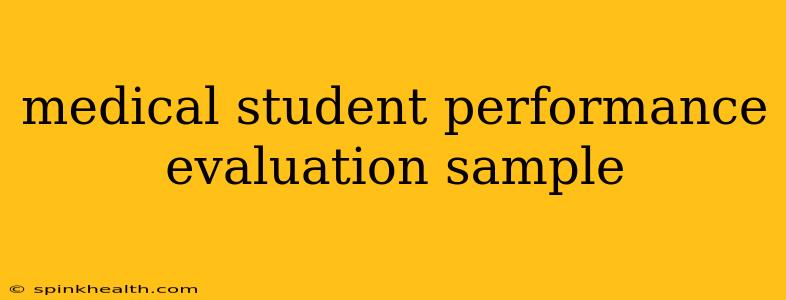Medical Student Performance Evaluation Sample: A Comprehensive Guide
The hushed reverence of the hospital corridor, the weight of responsibility in a doctor's eyes, the nervous excitement of a student observing their first surgery – these are the hallmarks of medical training. But behind the scenes, meticulous evaluation ensures students are ready for the demanding realities of a medical career. This guide delves into the world of medical student performance evaluations, providing a sample and exploring the nuances of this critical process.
Imagine Sarah, a bright, dedicated medical student nearing the end of her third year. Her rotation in cardiology has been both challenging and rewarding. Her attending physician, Dr. Ramirez, is now tasked with crafting a comprehensive evaluation that reflects Sarah's progress, strengths, and areas for growth. Let's look at a sample evaluation, drawing upon common criteria used in medical schools across the country.
Sample Medical Student Performance Evaluation:
Student Name: Sarah Chen Rotation: Cardiology Dates: January 15, 2024 – March 15, 2024 Evaluator: Dr. Maria Ramirez, MD
I. Clinical Skills & Knowledge:
-
History Taking and Physical Examination: Sarah consistently demonstrates proficiency in obtaining a comprehensive patient history, paying close attention to detail and effectively employing active listening techniques. Her physical examination skills are developing well; she accurately performs most examinations, and is actively seeking guidance on refining her technique, particularly in auscultating subtle heart sounds. She expertly documents her findings in a clear and concise manner.
-
Clinical Reasoning and Problem-Solving: Sarah displays a strong ability to analyze complex clinical scenarios, generating appropriate differential diagnoses and effectively formulating management plans. She demonstrates an excellent grasp of cardiovascular physiology and pathophysiology. During the case of Mr. Jones (acute myocardial infarction), she independently identified key diagnostic findings and contributed significantly to his management plan.
-
Procedure Performance: Sarah participated actively in various procedures, demonstrating a willingness to learn and a skillful approach to assisting the team. She showed aptitude in performing ECG interpretation and demonstrated proficiency in placing IV lines.
II. Professionalism and Interpersonal Skills:
-
Communication Skills: Sarah interacts respectfully and effectively with patients, their families, and colleagues. She shows genuine empathy and sensitivity towards patients, adapting her communication style based on their individual needs. Her communication with the interdisciplinary team is exemplary, fostering collaboration and efficient patient care.
-
Teamwork: Sarah is a highly valued member of the healthcare team, readily assisting colleagues and actively participating in team discussions. She is receptive to feedback, demonstrating a commitment to continuous learning and professional growth.
-
Ethics and Responsibility: Sarah consistently demonstrates an understanding of ethical principles in patient care, upholding patient confidentiality and acting with integrity. She takes responsibility for her actions and demonstrates a strong work ethic, consistently arriving on time and prepared for her duties.
III. Areas for Improvement:
-
Critical Appraisal of Literature: While Sarah possesses a solid understanding of cardiovascular medicine, further development of critical appraisal skills in reviewing medical literature would enhance her ability to critically evaluate the evidence base for clinical decision-making.
-
Independent Management of Patients: While proficient in many areas, Sarah could benefit from increased experience in independently managing patients under supervision, particularly in formulating and implementing treatment plans without constant guidance.
IV. Overall Assessment:
Sarah is a highly motivated and capable medical student with a strong foundation in cardiology. Her clinical skills, professionalism, and commitment to patient care are exceptional. With continued focus on developing her critical appraisal skills and increasing experience in independent patient management, Sarah is well-positioned for a successful career in medicine.
Overall Grade: Excellent
Recommendations: I strongly recommend Sarah for advanced studies and future roles in cardiology or related fields.
Frequently Asked Questions about Medical Student Performance Evaluations:
1. What is the purpose of a medical student performance evaluation?
The purpose is multifaceted: to assess the student's clinical skills, knowledge, professionalism, and overall readiness for advanced medical training and practice. It provides feedback for the student's improvement, guides educational decisions, and helps in the selection process for residency programs.
2. Who conducts medical student performance evaluations?
Evaluations are typically performed by attending physicians, supervising residents, or other preceptors who directly observe the student's clinical performance during their rotations.
3. What criteria are typically used in medical student performance evaluations?
Common criteria include clinical skills (history-taking, physical exam, diagnostic reasoning), professionalism (communication, teamwork, ethics), knowledge base, and overall performance. Specific criteria may vary depending on the institution and rotation.
4. How are medical student performance evaluations used in the residency application process?
Residency program directors heavily weigh these evaluations when assessing applicants. They provide valuable insights into a student's abilities, character, and suitability for a particular specialty. Strong evaluations are critical to securing a competitive residency spot.
5. How can medical students improve their performance evaluations?
By actively seeking feedback, demonstrating professionalism and teamwork, focusing on continuous learning, and consistently striving for excellence in patient care and clinical skills. Students should also actively participate in their learning, seek mentorship, and ask clarifying questions when needed.
This detailed sample and the accompanying FAQs provide a thorough overview of the medical student performance evaluation process. Remember, these evaluations are a crucial part of a medical student's journey, offering valuable feedback and contributing significantly to their future career success.

